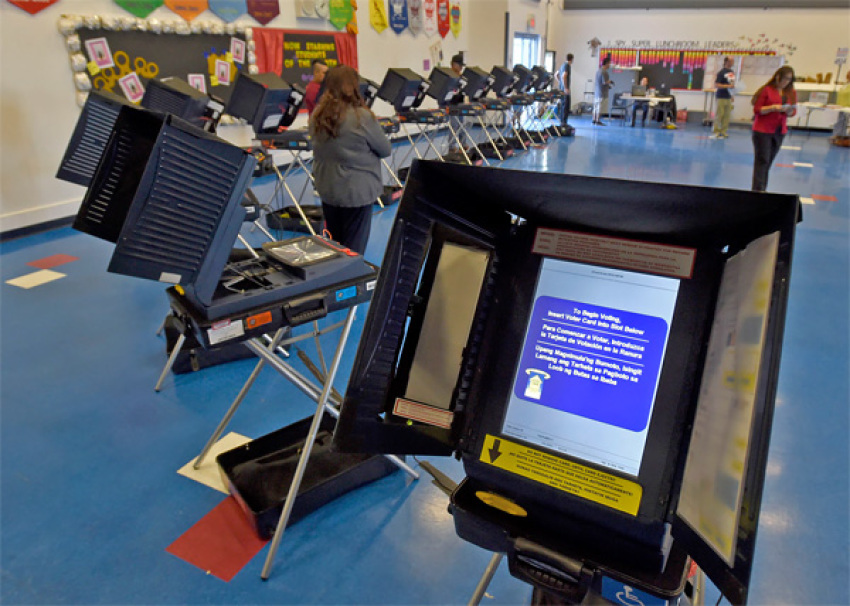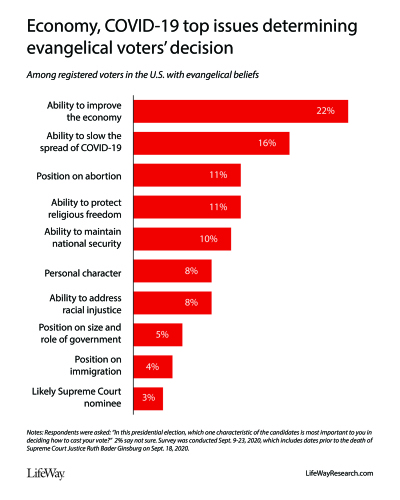Ethnicity, party is stronger than faith in determining vote among evangelicals: poll

A majority of voters who identify as evangelical support the reelection of President Donald Trump but this support remains skewed along ethnic and party lines, a new poll from Lifeway Research shows.
The online poll of 1,200 Americans conducted Sept. 9-23, with a plus or minus 3.2% margin of error, shows that among likely evangelical voters, 61% overall plan to vote for Trump while 29% are backing Democratic presidential nominee Joe Biden. Some 8% were undecided while about 2% supported other candidates.
Breaking down evangelical voters by race, the poll shows that most of Trump’s support from the group comes from white evangelicals. He leads Biden 73% to 18% among this group. When it comes to African American evangelicals, however, President Trump trails Biden 69% to 19%. Among other ethnicities, Trump holds a 58% to 32% lead among this group.

Among general Christians who attend church at least once a month, the poll shows Trump and Biden evenly split at 46% to 45%, respectively. The racial divide also remained persistent.
White churchgoers support Trump over Biden 59% to 30%, while African American churchgoers are solidly behind Biden, 86% to 9%. Biden also led Trump among Hispanic churchgoers, 58% to 36%, and among churchgoers of other ethnicities, 49% to 36%.
“Different ethnic groups are more attuned to specific failures of our country and of specific candidates,” Scott McConnell, executive director of LifeWay Research, said in a report on the poll. “One’s ethnicity and political party are more powerful in predicting the vote of someone with evangelical beliefs than their shared religious convictions alone.”
The divided outlook among evangelicals along racial lines exploded online as recently as Tuesday night during the first presidential debate between Trump and Biden when moderator and "Fox News Sunday" anchor Chris Wallace asked the president:
"You have criticized the vice president [Biden] for not specifically calling out ANTIFA and other left-wing extremist groups. But are you willing, tonight, to condemn white supremacists and militia groups, and to say that they need to stand down and not add to the violence in a number of these cities as we saw in Kenosha and we've seen in Portland?"
President Trump said "sure" he was "willing to do that," but noted that "almost everything I see is from the left-wing."
Biden then mentioned the Proud Boys, a far-right group led by Enrique Tarrio who's half black and half Cuban, while Wallace said white supremacists.
"The Proud Boys," Trump replied. "Stand back and stand by. But I'll tell you what, I'll tell you what, somebody's got to do something about Antifa and the left, because this is not a right-wing problem."
The statement “stand back and stand by” appeared to appall many watching the debate including prominent black Southern Baptist Convention Pastor Dwight McKissic who called out his peers for their silence on Twitter Wednesday.
“SBC didn’t hesitate to distance themselves from Prez Obama, in a resolution that was passed to congratulate him. Most SBC leaders will not distance themselves from Prez Trump’s failure to denounce White Supremacy, last night. Politics, emotions & race explains, why not? Sad!” he wrote.
In response to the media's accusations that the president has failed to condemn white supremacy, radio show host Annie Frey posted a thread on Twitter listing 16 times since 2016 that Trump has publicly condemned white supremacy.
Wallace asked the same question of Trump during a Republican primary debate in March 2016. In response, Trump said in part, "I totally disavow the Klu Klux Klan, I totally disavow David Duke."
In his first comment on the debate Wednesday, Trump said he did not know who the Proud Boys are.
— Donald J. Trump (@realDonaldTrump) September 30, 2020
Trump voters were more likely to cite the economy, 82%; national security, 67%; immigration, 62%; religious freedom, 49%; abortion, 44%; Supreme Court nominees, 42%; and the size and role of government, 40%, among the more important issues that determine their vote. Biden voters were more likely than Trump voters to point to COVID-19, 75%; racial injustice, 68%; and personal character, 66%, as behind their top issues for supporting the candidate.
When asked about the single most important issue in determining their vote, 26% of registered voters pointed to the economy, 22% said slowing the spread of COVID-19, while 15% said personal character. No other issue garnered more than 8%, according to the LifeWay report.
“Most evangelicals are not single-issue voters,” McConnell said. “Eighty-nine percent of those with evangelical beliefs selected more than one important issue that is influencing their vote. Like other Americans, their top concerns reflect the current recession and pandemic, but more than 1 in 10 with evangelical beliefs will vote for the candidate they think will protect their religious freedom.”



























